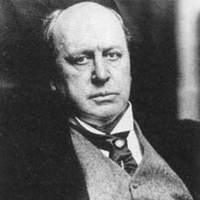Juxtaposition of Continental and American Culture in The Ambassadors
Woollett and Paris are used as symbols of two different cultures in the novel by Henry James named The Ambassadors. Woollett is a metropolitan American city. It represents the American materialistic culture. In this city Woollett life is mechanical. Mrs. Newsome lives in Woollett. She has run a big watch factory. The world of Woollett is much more time conscious.

Henry James (1843-1916)
Each and every minute, the world of Woollett is as busy as a bee. America tries to monetize time. Time has a monetary value. The culture of Woollett as symbolized by Mrs. Newsome puts the value of life. People living in the world of Woollett are obsessed with materialistic gain. That is why it can be safely said that the culture of Woollett is materialistic and mechanical. Moreover Mrs. Newsome is imposing and domineering. She is affluent. She is willing to accept Strether as her husband, given that Strether safely brings her son Chad Newsome back to Woollett from the tight grip of a vicious and bewitching woman who lives in Paris. Strether was under the domineering spell of Mrs. Newsome's selfish and practical spell of personality. That is why for Strether Woollett stands for a rigid and oppressive world devoid of life-nurturing and life soothing culture.
On the contrary, James has also used Paris as a symbolic center of timeless European culture of universal appeal of aesthetic enchantment. Viewed from Strether's perspective the culture of Paris is timeless. Here, life is free from the disease of time-consciousness. In Paris life dances with a moment to moment realization, of the joy and beauty of life. Paris can understand the eternal need of life for beauty, freedom, love and affection which the Woollett cruelly discards. Freedom is the hallmark of Paris. A sense of artistry and aesthetics underscores every human relationship in Paris. A pursuit of love, passion for freedom, moment to moment living and fulfillment of a timeless need of human life are all beautifully represented by the culture of Paris. If, Woollett is necessity, Paris is the achievement. If Woollett is hard reality, Paris is a nostalgic fantasy. If Woollett views human relation as a give and take bond, Paris views it as an exchange of heart in need of pure passionate love and affection. If Woollett represents the big factory of watch, Paris represents the amazing Hall of Glorianni.
By presenting the world of Paris and the world of Woollett, Henry James left an opportunity for readers as well as his peers in exile to compare and contrast two different cultures. To leave this opportunity or comparison between two cultures is the final target of Henry James as a novelist. Having presented this apparently ideal and timelessly appealing world of Paris James has also exposed its certain limitations and flaws. Finally Strether happened to know that Madame De Vionnet was not as ideal and as flawlessly sincere as she had appeared to be. She was a sort of Goddess to Strether. Strether was in ideal love with her. But the moment, Strether knew about her illicit game with Chad Newsome Strether was profoundly shocked. He knew the bitter most readily. Outwardly Madame De Vionnet was perfect. But inwardly she too was prone to sexual pursuit. Such an ideally impressive woman De Vionnet should not have enjoyed a boating with Chad who was about her son's age, had she had a son. She was not divorced from her husband. Her husband was still there. Her daughter was in a marriageable age. In this situation, it is surely illicit and immoral of De Vionnet to be in a sexual love with Chad Newsome. In addition Strether found himself unable to stay in Paris if Chad does not live there. If Chad returns to America, Strether too has to return. The absence of one troubles the other to live in Paris. That Paris is timelessly and aesthetically attractive is one thing. That it is charged with universally appealing spell is its plus point. Everything has pros and cons. As Paris has positive points, which does not mean it has no limitation, which does not mean it is flawless. It too has a negative side. De Vionnet's immoral and illicit relationship marks the limitation of what the Paris is capable of giving and what the world of Paris is capable of representing. If such an aesthetically spellbinding cultural world of Paris too has a weakness, then why should we cling to its magnetic charm? He further raises a question why not take the fantasy of Paris as normal? Why we are valorizing the trend of expatriation? And why not return to America? This is what Henry James himself called this as 'international themes'.
